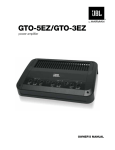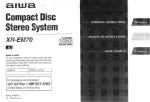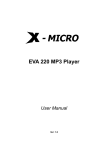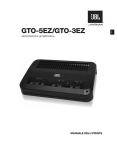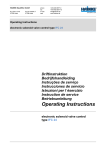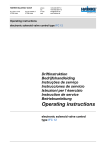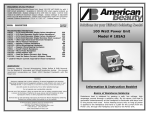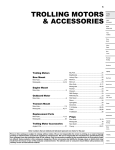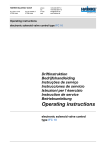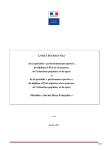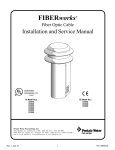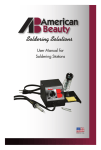Download - American Beauty Tools
Transcript
Soldering Solutions User Manual for Resistance-Based Soldering, Brazing & Thermal Wirestripping Systems www.americanbeautytools.com 1 TABLE OF CONTENTS TABLE OF CONTENTS 2 INTRODUCTION3 INTRODUCTION TO RESISTANCE SOLDERING 4-5 Definition 4 Core Requirements 4 Advantages 5 QUICK START GUIDE 6-7 Basic Set-Up 7 DEVELOPING YOUR PROCESS 8-10 Risk of Thermal Damage Caused by Overuse10 Refining Your Process 10 SAFETY 11 TWEEZER STYLE SYSTEMS 12 PLIER STYLE SYSTEMS 13 PROBE STYLE SYSTEMS 14 WIRESTRIPPING & REFLOW SYSTEMS 15 WARRANTY AND SERVICE DETAILS 16 Company Information American Beauty Tools are made just outside of Detroit Michigan, USA. Ph: 1.248.280.2810 1.800.550.2510 Fax: 1.248.280.2878 Email: [email protected] Website: www.americanbeautytools.com 2 INTRODUCTION American Beauty has been a fixture in the soldering tool marketplace since 1894. Our tools are a throw-back to a time when people took pride in the tools they used and companies took pride in the tools they manufactured. Today, American Beauty® tools are routinely chosen to tackle the most challenging soldering, brazing and thermal management applications with a diverse line of soldering irons and stations, solder pots, resistance soldering systems and accessories. With these types of tools, the operator plays an essential role in achieving quality end-results, avoiding injury and ensuring a long product lifespan. Please ensure that you take the time to read this manual carefully. It contains all the information required to understand how to properly set-up, operate & maintain this American Beauty equipment. Additionally, please feel free to visit our full-service website (www.americanbeautytools.com) for links to instructional videos, product specifications, a technical blog, an on-line shopping cart and much more. For those new to Resistance Soldering/Brazing and it’s many uses, rest assured, it is a tried and true product that offers many benefits. American Beauty has been manufacturing, testing, and refining their entire line-up of Resistance Soldering, Brazing, and Thermal Wirestripping equipment for over fifty years. As the manufacturer of the world’s largest assortment of power units, handpieces, and related accessories, we pride ourselves in being the leader in the design and development of resistance based soldering equipment. All American Beauty products are manufactured using the highest quality materials available and are assembled with great care so they will consistently conform to our quality specifications. This manual will provide an overview of the principles behind Resistance Soldering, Brazing, and Thermal Wirestripping, and other applications requiring intense localized heat. General operating procedures as well as guidelines for model/system selection will be covered to help make your Resistance Soldering, Brazing, or Thermal Wirestripping experience a positive one. If you have purchased a specific product, it’s product data sheet will be inserted in the centerfold of this manual. www.americanbeautytools.com 3 INTRODUCTION TO REISTANCE SOLDERING Definition re•sist•ance sol•der•ing- a method of soldering where the heat to melt solder is instantaneously generated by passing an electrical current through a resistive material. Core Requirements Power Unit & Footswitch The foundation of a resistance soldering system; produces and controls an ample supply of safe high amperage, low voltage current. Handpiece Completes an electrical circuit carrying the current from the source, through the pieces being soldered and back. Electrodes Generates an instant and intense level of thermal output as current is forced through its highly resistive material. 4 INTRODUCTION TO REISTANCE SOLDERING Advantages Smash Operational Bottlenecks Concentrated heat reduces solder many times over. Flameless process Improve Solder Joint Quality Poor solder joints are often the result of insufficient heat throughout the joint, creating weak spots. Eliminate Thermal Damage Traditional soldering methods introduce too much heat into surrounding areas damaging critical components or desoldering of previously soldered joints. Reduce Liability Light-weight handpieces cool within seconds, greatly reducing the likelihood of repetitive strain injury and virtually eliminating the burn risk for the user. Solder in Tight Spots Versatile systems allow easy access to restricted areas. Cut Down on Energy Consumption Instant heat means you’re not paying to heat a soldering station all day long. Save on Maintenance and Consumables Electrodes last twice as long as soldering tips and don’t require constant re-wetting/tinning. American Beauty When it comes to Resistance Soldering, no other company in the world combines the depth of knowledge with the breadth of product offerings as American Beauty Tools. We offer the widest selection of handpieces, electrodes and power units and back our equipment with the industry’s best warranty. www.americanbeautytools.com 5 QUICK START GUIDE System set-up for Resistance Soldering is fairly simple and requires relatively few steps. Care should be taken during each step by keeping in mind the Safety Guidelines outlined later in this manual. Most of our Resistance Soldering Systems come with 3 basic components: Power Unit, Footswitch, Handpiece (additional components may be included depending on the system you have purchased). 1. Insert the plug from the Power Unit into the piggy-back receptacle on the Footswitch. (Image 1) Note: Our high voltage versions feature hardwired footswitches, eliminating this step. 2. Plug the Footswitch/Power Unit plug combination into an appropriately rated outlet. (Image 2) 3. Adjust the power setting on the Power Unit to the lowest setting (if applicable). 4. Turn the Power Unit “On”. Note: the power light will not come on at this point. 5. Depress the Footswitch. The indicator light for power should come “On” when the Footswitch is depressed and “Off” when it is released. 6. With the Power Unit “Off”, install the Handpiece to the Power Unit by inserting the taper pins into the receptacle or by threading the ring terminals onto the threaded posts (Image 3 & 4, next page). In the case of a Single Probe Handpiece, the Lead for Return Current will need to be used. 6 QUICK START GUIDE 7. You are ready to start using your system. 8. Systems can be operated without a footswitch but it is not recommended. Basics of Set-Up All of the American Beauty Handpieces use either a Ring Terminal or Taper Pin to connect to the power unit. Always connect the handpiece to the power unit with the power “OFF” or unit unplugged. Ring Terminal Taper Pin It is essential that the connection between the handpiece and power unit is flush and secure at both points to avoid intermittent heating at the solder joint. It is a good habit to double check these connections at the beginning of each shift or after extended down-time. The output receptacles on your power unit that the handpiece plugs into should be treated like a plug outlet in the wall. DO NOT apply a metal piece or strip across these receptacles, as it will result in “live current” being released and could lead to electrical shock. www.americanbeautytools.com 7 DEVELOPING YOUR PROCESS The goal of your process is to establish the shortest, controllable cycle time to achieve a quality solder joint, without causing thermal damage to the components being soldered. To develop this process you will need a basic understanding of how resistance soldering generates heat and some scrap pieces for testing. Resistance soldering systems require an electrical circuit running from the power unit, down the handpiece and through the solder joint itself, which is why our systems cannot be used to heat non-conductive components In the graphic above, the electrodes holding the soldered components have a much higher degree of electrical resistivity than the rest of the circuit. When electricity is forced through a resistive material, the result is heat. Since the components being soldered have their own unique resistive qualities, heat is also being generated within the joint itself. The result is virtually instantaneous, intense heat that stays largely localized to the point(s) of contact. Therefore heat and speed at the solder joint is going to be unique to each application, based upon system used and materials/components soldered. Hence, the need for a ‘trial and error’ approach to process development that will require scrap components and a few rounds of testing. Note: Please keep in mind, that while cleanliness of materials has always been paramount to a quality solder joint, it takes on an even greater importance with resistance soldering. Oxidation, contaminants and any coatings can impede the flow of electricity and render resistance soldering ineffectual. 8 DEVELOPING YOUR PROCESS • Begin with a mid-range power setting. • Ensure a good fit between the components to be soldered. Establish contact between the electrode(s) of your handpiece and the components. Electrodes should be as close to the solder joint as practically possible. • Depress the footswitch. You can often feel and hear that the system has activated by a slight vibration in the handpiece and buzz in the power unit. If you do not, it’s most likely that an electrical circuit has not been established. Check connections and cleanliness of components and electrodes. • Hold solder at the joint so that it will begin to reflow as soon as the temperature at the joint permits. (If solder has not flowed after 20 seconds, STOP. Allow components to cool, turn the power setting higher and repeat.) • Once you are satisfied with the amount of solder added to the joint, release the footswitch and let cool. Warning: Components will take much longer to cool than they took to heat. • Evaluate solder joint and surrounding materials. • Did the solder flow too quickly resulting in an unreliable solder joint or uncontrollable application of heat? If so, turn the setting lower and repeat as necessary until satisfied. • Was the cycle time too slow, resulting in thermal damage to the components and/or surrounding materials? Turn the setting higher and repeat as necessary until satisfied. • Ideal cycle times are typically between 3 to 8 seconds. Larger joints or brazing will require longer cycle times. (Please pay close attention to Risk of Thermal Damage Caused by Overuse, pg 10) Watch our Soldering Guru tackle all sorts of challenging jobs using our Resistance Soldering Systems. Scan here or follow this link. www.youtube.com/user/SolderingGuru www.americanbeautytools.com 9 DEVELOPING YOUR PROCESS Risk of Thermal Damage Caused by Overuse An ever-present concern with any resistance based system is the buildup of heat within the system’s handpiece and power unit. Left unchecked, this buildup can cause permanent, non-warrantied damage to your system. Here are some steps that should be taken to reduce this occurrence. Follow a 50/50 Duty Cycle ~ as a general rule, your system should idle (cool) for an equal period of time that its ‘active’, with cycle time not exceeding 20 seconds. Monitor the Heat ~ Operator MUST monitor the heat that builds-up within their handpiece’s cables and handle. Warm is normal. Hot is a clear sign that the system is being overtaxed and should be allowed to rest and dissipate the heat. Reduce cycle time ~ You always want to be soldering as fast as controllably possible. The longer you are ‘active’ on a solder joint, the more time for heat to buildup within the handpiece and power unit. Turning up the power, shortens the active cycle time and thereby reduces the opportunity for thermal build-up. If you are already operating at the top power setting, you may wish to investigate moving to a high wattage power unit. Handpiece Stacking ~ If your application simply requires prolonged ‘active’ cycle times, investigate running two handpieces off of one power unit. This is called handpiece stacking and can assist heavy users in production style environments. Refining Your Process For those desiring further control and refinement once their process has been developed, a Precision Timer Module can be added to the system to more accurately control your cycle time making it more repeatable and reliable. The Precision Timer Module can be set to your cycle time requirement and used to power up your system for a defined period of time accurate to a hundredth of a second. American Beauty offers the 105PTM for systems 1,100 watts and less, or the 105HCPTM for systems of 1,200 watts or more.. 10 SAFETY As with any soldering process, the presence of electrical current and high temperatures are required to make the system work. Each application should be evaluated for unique safety needs beyond the general guidelines listed below and the appropriate training developed. • Most American Beauty Resistance, Brazing and Thermal Wirestripping Systems are available in both a low voltage (110120VAC) and high voltage (220-240VAC) version. Please consult your cord label to determine what version you have purchased and ensure your system is properly plugged in to the appropriate outlet. • Always wear Personal Protective Equipment (PPE) when operating your system. This includes safety glasses, protective gloves, and sleeves (if necessary) to cover your body. • The temperature of your electrodes and parts of your handpiece can reach in excess of 900°F. Mishandling can result in a serious burn or fire. • Do not touch any metal parts of the handpiece while in operation. • Do not use the unit for any application other than it’s intended use. • Do not leave unit unattended. • Soldering will produce smoke. Make sure the soldering location selected is well ventilated. • Let the handpiece cool to room temperature prior to storage or before changing electrodes. • Always make sure the unit has been properly turned OFF and unplugged when finished using or prior to moving unit. • Never attempt to perform repair, replacement, diagnostics, or routine maintenance while unit is plugged in. • Repairs should only be performed by a qualified technician familiar with the product. • Do not modify the system or use it with damaged parts. www.americanbeautytools.com 11 TWEEZER STYLE SYSTEMS Features, Benefits and Other Considerations • Family of systems ranging from those appropriate for microconnectors and PC Board work to those with enough power to tackle large military connector and 4G antennas. • Electrodes can be bent to allow for even better access to difficult locations. Tip from our Soldering Guru ~ Insert the electrodes into a vise & bend to approx. 25 degrees, reinsert, rotate and align so that tips are at appropriate distance to match your application. • Tweezer functionality and lighter handpieces lends itself to ‘hold in place’ functionality during soldering operation and electrodes last considerably longer than soldering tips. • Available systems run from 100 to 1,800 watts, maximum working opening between electrodes ranging from .375” to .625” and electrode diameters from .04” to 1/8”. Most Popular Systems Model Name Model # Micro Capacity Tweezer Style 10599 Ultra-Light Capacity Tweezer Style 10501 Light Capacity Tweezer Style 10502 Standard Capacity Tweezer Style 10504 High Capacity Tweezer Style 105L7 Ultra-High Capacity Tweezer Style 105K5 12 PLIER STYLE SYSTEMS Features, Benefits and Other Considerations • The carbon electrodes used in these systems have a higher intrinsic resistivity to electricity and permit more surface contact than the steel electrodes used in tweezer systems . The result is more intense heat and better thermal saturation, lending these systems to tackle more demanding applications, such as semirigid coax, brazing operations and production work. • Electrodes can be easily shaped or notched with a jewelers file or similar tool. Tip from our Soldering Guru ~ Modify the electrode to match the contour of the intended components surface. A little extra time in prep results in easier soldering later. • Available systems run from 250 to 3,000 watts, working opening between electrodes ranging from .25” to 3” and electrode widths from .25” to .5”. Most Popular Systems Model Name Model # Light Capacity Plier Style 10506 Standard Capacity Plier Style 10507 High Capacity Plier Style 105L5 Ultra-High Capacity Plier Style 10505 Resistance Brazing System 10557 Resistance Brazing System-High Capacity 10577 www.americanbeautytools.com 13 PROBE STYLE SYSTEMS Features, Benefits and Other Considerations • Probe systems require the use of a return lead to close the electrical circuit required for resistance systems to function. When this is feasible, single probe systems are highly desirable as they offer instant, localized heat combined with pin-point control. Ideal for multi-pin connectors, multiple joints along a bus-bar, and many other challenging joints. • Try using a conductive plate or mounting fixture for added repeatability. Tip from our Soldering Guru ~ Depending upon materials being soldered, the return lead does not always have to be clamped directly on, or even near, the joint being soldered. • Available systems run from 100 to 3,000 watts with electrodes diameters ranging from 1/16” to ½”. Most Popular Systems Model Name Model # Ultra-Light Capacity Probe Style 10508 Light Capacity Probe Style 105L9 Standard Capacity Probe Style 10509 High Capacity Probe Style 105H9 Fixed Dual Probe Style 10535 Resistance Brazing System-Probe Style 105U9 14 WIRESTRIPPING & REFLOW SYSTEMS Features, Benefits and Other Considerations • Wirestripping and Reflow systems differ from the other styles of resistance soldering systems, as these systems pass a controlled current through a closed-loop resistive material, creating a hotformed wire that can be used to strip insulating jackets off wires (including Teflon and other PTFE-type materials), used as a hotknife to melt and trim plastics and waxes, reflow solder balls, and even perform some wood burning. • Wirestripping handpieces are either tweezer style for smaller gauge, or V-notch style for stripping the insulation on large wires and cables. • Stripping with heat versus a blade guarantees not to nick any conductors. • Available systems run from 100 to 1100 watts with a wide variety of handpiece styles. Most Popular Systems Model Name Model # Thermal Wirestripping System - Micro Capacity 10503M Thermal Wirestripping System - Std. Capacity 10503 Thermal Wirestripping System - High Capacity 10503X Reflow System - Micro Capacity 105RFM Reflow System - Standard Capacity 105RFS Reflow System - High Capacity 105RFH www.americanbeautytools.com 15 WARRANTY & SERVICE DETAILS Warranty Details American Beauty tools are warrantied to be free from defects in material and workmanship as outlined below. No warranty is made with respect to products which have been altered, subjected to abuse or improperly used. Consumable Parts - NOT COVERED Items include such parts as Soldering Iron Tips, Desoldering Braid, Resistance Soldering Elements and Electrodes, etc. Serviceable Parts - 90-DAY PERIOD Items include such parts as are Heating Elements, Thermostats, Voltage Controllers, Cord-sets, etc. It is the customer’s responsibility to make themselves aware of proper operating parameters, that when not followed, can greatly reduce the life-span of this type of part. Standard American Beauty Products - 3-YR PERIOD These items include all American Beauty soldering tools that don’t fall into the two categories highlighted above. Complete warranty details can be located on our company website at www.americanbeautytools.com/warranty Repair Service Eventually even the toughest soldering tools require minor repair work. We have expanded our internal repair department and reassigned our most experienced technicians to work on repairs. We implemented customized software to ensure accurate and timely processing of all returned products. Save yourself unnecessary downtime and aggravation by taking advantage of American Beauty’s worldclass repair and refurbishment service. Contact us today to make arrangements, or visit www.americanbeautytools.com/repair 16
















